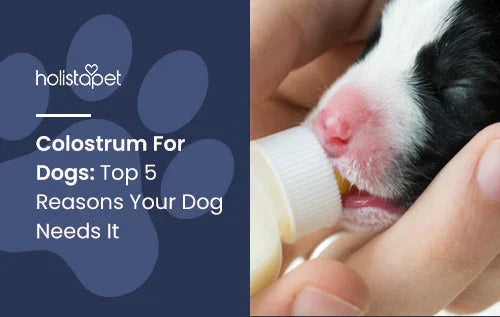Dimethylglycine for dogs has gotten a lot of attention for its health benefits and ability to supercharge canine well-being. Also called DMG, this essential amino acid can help boost physical performance and support immune system health in your furry friend.
Pet parents who prefer natural options over regular medicine can go for dimethylglycine. But dog owners need to learn about DMG's benefits and safety guidance before anything else. That's why, in this article, we'll take a closer look at how DMG helps our four-legged friends and what to watch for when using it.
What Is Dimethylglycine (DMG)?
Dimethylglycine is a naturally occurring substance in the cells of animals and plants. It's related to amino acids, particularly the amino acid glycine, and plays a role in metabolic processes. One of the building blocks for good health in dogs, DMG helps build important molecules and supports energy levels in dogs. It supports immune response, muscle recovery, and overall well-being.
Are There DMG Supplements Made Specifically for Dogs?
Yes, there are dimethylglycine supplements made specifically for dogs. These dog-specific products support the unique needs of canines and come in various forms, such as soft chews, liquids, and powders. Pet supplement manufacturers know the specific requirements of our dog friends. So, these companies carefully balance DMG with other ingredients, like vitamins and minerals, to enhance the supplement's effects.
How May Dogs Benefit From Dimethylglycine?
DMG offers many benefits that may help improve your dog's quality of life. We'll explore these in more detail later, but here's a quick overview:
- Muscle Support. Dimethylglycine promotes muscle strength and may help the body recover faster from physical exertion.
- Promotes Mobility and Athletic Performance. DMG can prevent lactic acid buildup in energetic pets, helping sustain mobility.
- Might Ease Inflammation. By helping reduce tenderness and puffiness, dimethylglycine may help manage canine discomfort.
- Promotes Immunity Health. It also provides immune system support, helping enhance your dog's immune response to fight off sickness.
Muscle Support
DMG helps keep dogs' muscles strong. Strong muscles mean your dog can play and move around without getting tired too quickly.
Senior dogs, active pups, or canines with muscle weakness can benefit greatly from dimethylglycine. When they take DMG, its amino acid helps their body cope faster after exercise. Your pet can feel less discomfort and aches after a long day of fun.
Promotes Mobility and Athletic Performance

DMG helps boost a dog's physical abilities. It can help improve oxygen utilization and reduce lactic acid buildup, aiding physical and athletic performance. This dimethylglycine function is great for pets who love running, jumping, and playing.
Regularly taking dimethylglycine supports canines' joints and muscles. It also helps maintain agility and energy levels. With DMG, physical activities are easier and more enjoyable for our dog friends.
May Ease Inflammation
DMG may help soothe swelling, puffiness, and tenderness in the body. Animal companions with mobility issues will find dimethylglycine extremely helpful.
Dimethylglycine helps manage irritation that can make dogs feel sore or uncomfortable. By taking dimethylglycine, your furry buddy can have a more comfortable day-to-day life. It can greatly affect how lively and playful your dog feels.
Promotes Immunity Health
Including DMG in your pet's health regimen can provide immune support and help keep your furry pal healthy. Dimethylglycine can help your pet's body fight off infections and recover more quickly from illness. As a result, your dog can have more days feeling good and fewer days feeling sick.
Dimethylglycine provides immune support by helping the body's natural defenses work better. As an immune system modulator, DMG helps balance your dog's immune responses. Canines that regularly take DMG may not get sick as often and can enjoy a healthier life with their families.
What Is the Best Way To Give DMG to Dogs?
The best way to give dimethylglycine to dogs is through supplementation. Supplements come in different forms, such as chews, liquids, and powders. Using a supplement ensures that your dog gets a concentrated amount of DMG. This method is more effective than trying to add DMG through food alone.
Some products, like HolistaPet's, also contain other beneficial ingredients. They are easy to administer to pets, whether mixed in with their food or given as a treat. Supplementation surely simplifies the whole process for dog owners.
What Kind of Dimethylglycine Supplements Are Offered to Dogs?
Different DMG supplements are available for canines. One popular option is HolistaPet's Muscle Support Soft Chews for Dogs. These chews combine DMG with other great nutrients, such as potassium chloride, lysine, and taurine. They are yummy, easy to administer, and helpful for muscle strength and overall well-being.
There are also other DMG products available. They may come in other forms, like liquid solutions, powdery mixes, tablets, and capsules. You can apply the DMG supplement directly to your pet's mouth or mix it with their food for easy administration.
View All Our Supplements for Dogs Here
Dimethylglycine for Dogs - Frequently Asked Questions
Dimethylglycine is becoming a popular supplement for our canine friends. As interest grows, so do the questions about its benefits, usage, and safety. In the following sections, we'll address some of the most frequently asked questions about DMG for dogs. Keep reading to get some helpful information.
How Effective Is Dimethylglycine?
Dimethylglycine can be effective in supporting various aspects of dog health. Its benefits include supporting immune response, aiding muscle recovery, and boosting energy levels. Anecdotal evidence from dog owners proves improvements in pets' vitality after starting DMG.
Some studies suggest that DMG can help optimize oxygen utilization in the body. This process can help enhance physical performance and endurance in dogs. For these reasons, DMG has become a key supplement for canines' athletic activities and everyday functions. Dog owners may notice improvements in their pets within two weeks of starting DMG.
How Often Should DMG Be Given to Dogs?

Dimethylglycine dosage for dogs can vary depending on the product used and the dog's body weight, size, age, and health status. Generally, you should follow the manufacturer's or veterinarian's dosage recommendations.
For most supplements, DMG is typically given once or twice a day. Maintaining a consistent schedule is vital to achieve the best results. Regular supplementation can maintain steady DMG levels in your dog's system.
Can Dogs Have Too Much Dimethylglycine?
Yes, dogs can have too much dimethylglycine. While DMG is generally safe, excessive amounts can lead to minor side effects.
It’s important to stick to the recommended dose and not exceed it without advice from a veterinarian. Following the recommended dosage on the packaging or from your vet can ensure that your dog benefits from DMG without any unwanted effects. Here's a general recommendation using body weight as a reference:
- Dogs under 20 lbs - 0.5 ml daily
- Dogs 20-40 lbs 1.0 ml daily
- Dogs over 40 lbs - 1.5 ml daily
Most dogs handle DMG well. However, over-supplementation can lead to mild side effects. Some documented side effects include digestive upset or changes in behavior. If you notice any unusual symptoms after starting DMG, call your vet.
Is It Okay if I Miss Giving My Dog DMG?
Occasionally missing a dose of dimethylglycine is not typically cause for concern. DMG works best when given consistently. Missing one dose, however, won't drastically affect the overall benefits.
If you miss a dose, simply continue with the regular schedule as soon as you remember. Doing so will help maintain a safe and effective routine without overwhelming your dog's system with a sudden, large amount of DMG.
Are There Any Potential Side Effects or Risks Involved?
DMG is generally well-tolerated by dogs, and side effects are rare. However, like any supplement, there is always a potential for mild reactions. This is especially true when first introducing it to your pet’s routine.
Common signs to watch include gastrointestinal upset, such as diarrhea or vomiting. Less common signs are changes in behavior or appetite.
Start with a lower dose and gradually increase to the recommended level. Doing so will allow your dog’s body to adjust. If any adverse reactions occur, discontinue use and consult a veterinarian immediately.
Can DMG Interact With a Dog’s Medication?
Dimethylglycine is generally considered safe and doesn't typically interact with most medications. However, if your dog is on any prescription drugs, it’s important to talk with your veterinarian. This step is especially crucial for medications that affect the immune system or the body’s metabolic processes, as DMG influences these systems.
Your vet can provide expert guidance based on your dog's health history and medications. Confirming that the supplement you choose fits your dog's existing treatments is highly important.
Do I Need to Monitor My Dog When Giving Dimethylglycine?

Yes, monitor your dog closely when starting them on dimethylglycine. Any changes in their behavior or health can indicate whether DMG is working or if you need to make adjustments.
Look for positive changes, such as increased energy and better mobility. Also, look for any signs of discomfort or unusual behavior. Regular check-ins with your veterinarian can help track your dog's progress and ensure the supplement brings the intended effects.
Do DMG Supplements for Dogs Go Bad?
Yes, DMG supplements for dogs have a shelf life and can go bad if not stored properly. Always check the expiration date on the package. Also, keep the supplement in a cool, dry place, away from direct sunlight. Doing so will ensure it remains effective and safe for consumption.
Degradation of active ingredients in DMG products can occur over time. Heat or moisture are usually the culprit, as they can reduce the product's effectiveness and safety. Always adhere to storage instructions and be mindful of expiration dates. These are crucial steps in maintaining the quality of your dog’s DMG supplement.
What’s the Best Way To Store Dog Dimethylglycine Supplements?
It's important to store your dog's DMG supplement properly to prolong its shelf life. Here are a few tips for optimal storage:
- Store the supplement in a cool, dry place where the temperature is consistent.
- Avoid areas prone to moisture, like bathrooms or kitchens, as humidity can affect the supplement's stability.
- Avoid leaving the container open or in direct sunlight, as light can degrade some ingredients.
- Keep the supplement in its original packaging to prevent contamination or mislabeling.
- Ensure the lid or cap is tightly sealed after each use to prevent exposure to air.
Are Human DMG Supplements Safe for Dogs?
DMG supplements for humans are not recommended for dogs. Dimethylglycine itself is safe for canines. However, products for humans often contain concentrations and ingredients that may not be ideal for animals. These products may include higher doses of DMG or other compounds harmful to dogs in large quantities.
Always choose DMG products specifically formulated for dogs, like ours at HolistaPet. Such products meet canines' nutritional needs and safety requirements. A quality dog-specific supplement can ensure your furry pal receives the right amount and form of support without any unnecessary risks.
Final Thoughts - Dimethylglycine for Dogs [Supplements & Safety Advice]
Including dimethylglycine in your dog's wellness regimen can offer numerous benefits. A DMG supplement can help enhance muscle recovery and boost immune health, among other things.
It's crucial to use DMG products designed for dogs to ensure safety and effectiveness. Always consult your vet before starting any new supplement. Lastly, observe your pet's response and adhere to proper dosage and storage practices. By following all these guidelines, you can support your furry friend's overall wellness and vitality.


![muscle support supplements for dogs [soft chews] product image](https://cdn.shopify.com/s/files/1/0765/3946/1913/files/muscle-support-for-dogs_600x600.jpg?v=1725855605)
 CBD Oil for Dogs - Fast Acting
CBD Oil for Dogs - Fast Acting
 Chicken Flavored CBD Oil For Dogs - Easy Dose
Chicken Flavored CBD Oil For Dogs - Easy Dose
 Salmon Flavored CBD Oil For Dogs - Highly Rated
Salmon Flavored CBD Oil For Dogs - Highly Rated
 CBG Oil for Dogs and Cats - Loved by Thousands
CBG Oil for Dogs and Cats - Loved by Thousands





Leave a comment
All comments are moderated before being published.
This site is protected by hCaptcha and the hCaptcha Privacy Policy and Terms of Service apply.